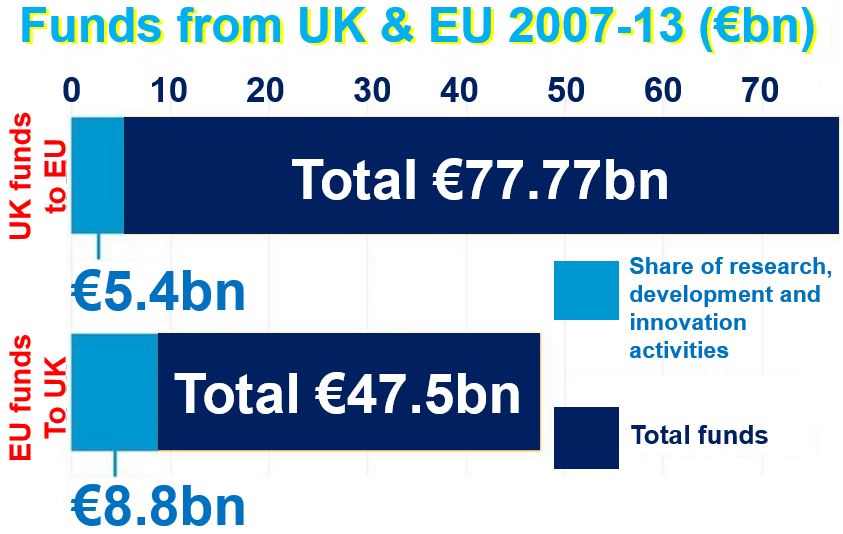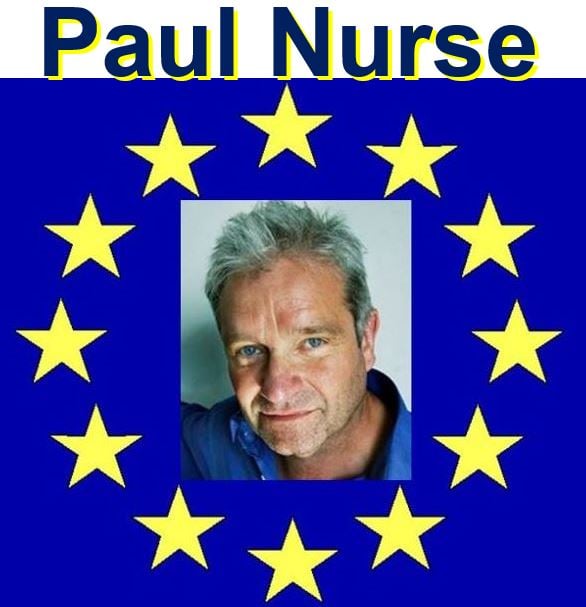Stephen Hawking and 150 other scientists say Brexit would be a disaster for British science, but UKIP, the anti-EU party, says the opposite and accuses the pro-EU scientists of ‘scaremongering’. The scientists – all of them fellows of the Royal Society – expressed their fear of what would happen if the UK left the European Union in a letter to The Times.
In their letter, they say that Brexit would spell the end of global scientific talent coming to the UK – the country would no longer be a major hub in the world of science.
 One hundred and fifty eminent scientists wrote in a letter that Brexit would be a disaster for UK science. An impressive list of academics and a stark warning. (Image: twitter.com)
One hundred and fifty eminent scientists wrote in a letter that Brexit would be a disaster for UK science. An impressive list of academics and a stark warning. (Image: twitter.com)
Many EU scientists come to the UK
Many young scientists in Britain are recruited from Europe, the letter explains.
According to the letter:
“We now recruit many of our best researchers from continental Europe, including younger ones who have obtained EU grants and have chosen to move with them here.”
“Being able to attract and fund the most talented Europeans assures the future of British science and also encourages the best scientists elsewhere to come here.”
UK science and the nation’s economy have benefitted significantly from EU funding, the scientists claim.
Non-EU Switzerland struggles
They give as an example Switzerland, a country that is not in the EU but contributes money to the EU. However, it has very limited access to funds and finds it much more difficult than Britain does to attract fresh talent, due to freedom of movement restrictions.
 The figures above could be argued by both pro-EU and Brexit supporters. One group could say science does well out of the EU (light blue), while the other group could say there would be much more money spare – for science – if the UK did not have to give so much to the EU and receive so little (dark blue). (Image: royalsociety.org/topics-policy)
The figures above could be argued by both pro-EU and Brexit supporters. One group could say science does well out of the EU (light blue), while the other group could say there would be much more money spare – for science – if the UK did not have to give so much to the EU and receive so little (dark blue). (Image: royalsociety.org/topics-policy)
Regarding freedom of movement, the scientists wrote:
“If the UK leaves the EU and there is a loss of freedom of movement of scientists between the UK and Europe, it will be a disaster for UK science and universities.”
“Investment in science is as important for the long-term prosperity and security of the UK as investment in infrastructure projects, farming or manufacturing; and the free movement of scientists is as important for science as free trade is for market economics.”
Sir Alan Fersht, a chemist at the Laboratory of Molecular Biology and an Emeritus Professor in the Department of Chemistry at Cambridge University, organised the letter.
UKIP says Brexit a boost for British science
Research biochemist Dr. Julia Reid MEO, UKIP’s science spokesperson, dismissed the contents of the letter as scaremongering.
Regarding the warning letter to The Times, Dr. Reid said:
“This is a facile argument because long before the UK joined the Common Market, and before the implementation the of EU’s Single Market policy, there was always free movement of scientists throughout Europe and the world.”
“If anything the UK’s current immigration policy, driven by the large numbers of EU citizens coming from Eastern Europe, mean that we discriminate against the young talented scientists who wish to come to the UK from the rest of the world.”
“I am astonished at the content of this letter that has appeared in The Times. Clearly, these academics fail to recognise that the EU is a failed experiment.”
 According to Sir Paul Nurse, the UK today is among the top few world leaders in scientific research & development. If we left the EU, we could slip from the world stage. If we turn our backs on the EU, its members may turn their backs on us, he warns.
According to Sir Paul Nurse, the UK today is among the top few world leaders in scientific research & development. If we left the EU, we could slip from the world stage. If we turn our backs on the EU, its members may turn their backs on us, he warns.
Dr. Reid pointed out that in February, Professor Angus Dalgleish, one of the leaders worldwide in cancer research, complained that the EU’s Clinical Trials Directive had increased the costs of his cancer research by a factor of ten, which brought all research he was involved in to a halt.
Prof. Dalgleish said the EU is responsible for a severe decline in academic clinical trials throughout the United Kingdom.
Dr. Reid added:
“Scientific and medical research in the UK is the envy of the world. Seven out of the top ten European Universities are in the UK, four of which are in the top five. It is our research and academic excellence which will attract investment in scientific research to the UK and not the fact that we are part of a failing political union.”
“If we look at the global picture it becomes clear that in the modern world the leading centre of research is not the EU but elsewhere, primarily the United States and China, and remaining a member of the EU, far from enhancing our ability, in fact restricts it. You only have to look at the scientific research published in 2014 to see that the lions share comes from the US and China with the UK third.”
 Scotland and Wales are clearly more pro-EU and much of England. (Image: twitter.com)
Scotland and Wales are clearly more pro-EU and much of England. (Image: twitter.com)
Historically, Britain has always collaborated with the top researchers and academic institutions globally, and will carry on doing so when free of EU bureaucracy, red tape and regulations that are holding back the country’s science, Dr. Reid insisted.
Dr. Reid finished by saying:
“It is time to leave the EU and by doing so British Scientists will once again become true global pioneers.”
Royal Society urges voters to consider science
In December, President of the Royal Society, Sir Venki Ramakrishnan, said:
“The outcome of the UK’s referendum on EU membership is an important issue for the UK. Of course science will only be one of many things people have on their minds when they cast their vote.”
“However, we would like to encourage them to factor it in as a consideration in this debate. Scientific research affects our daily lives and the long term growth of our economy, and brings many benefits to society in health, energy, food and the environment, to name but a few key areas.”
Sir Paul Nurse warns of Brexit consequences
In February, Nobel laureate Sir Paul Nurse, said that Brexit would be bad for science in Britain.
He described politicians who support leaving the EU as opportunists whose tactics could cost the country’s current and future scientists dearly.
Sir Paul, who was once President of the Royal Society and is currently Director of The Francis Crick Institute, said that British scientists would find it much more difficult to get R&D funding if Britons chose to leave the economic bloc – the decision would ‘sell future generations short,’ he warned.
Sir Paul Nurse said:
“We need a vision for our future that is ambitious and not to run away and bury our heads in the sand, and we can best do this by staying in the EU. We should not be side-tracked by short-term political opportunism.”
“Being in the EU gives us access to ideas, people and to investment in science. That, combined with mobility (of EU scientists), gives us increased collaboration, increased transfer of people, ideas and science – all of which history has shown us drives science.”
Scientists for Britain
Scientists for Britain – a group that backs Brexit – urges Britons, especially scientists, to free themselves of the myth that the country’s scientific community is somehow less solid and robust than it really is.
Our country has always been one of the leading players in the world of science, the group says.
Scientists for Britain wrote on its website:
“Indeed, a recent UK Government funding document found that the UK produced around 15.1% of the world’s most highly-cited (or regarded) scientific papers. From these figures, there is no doubt that our industrious and talented scientists punch way above their weight when it comes to global science – hardly a position of weakness.”
Video – What is Brexit?

